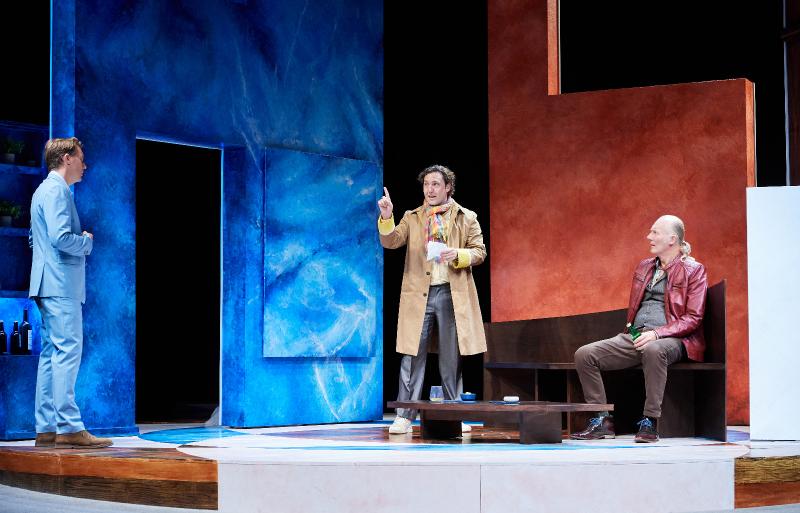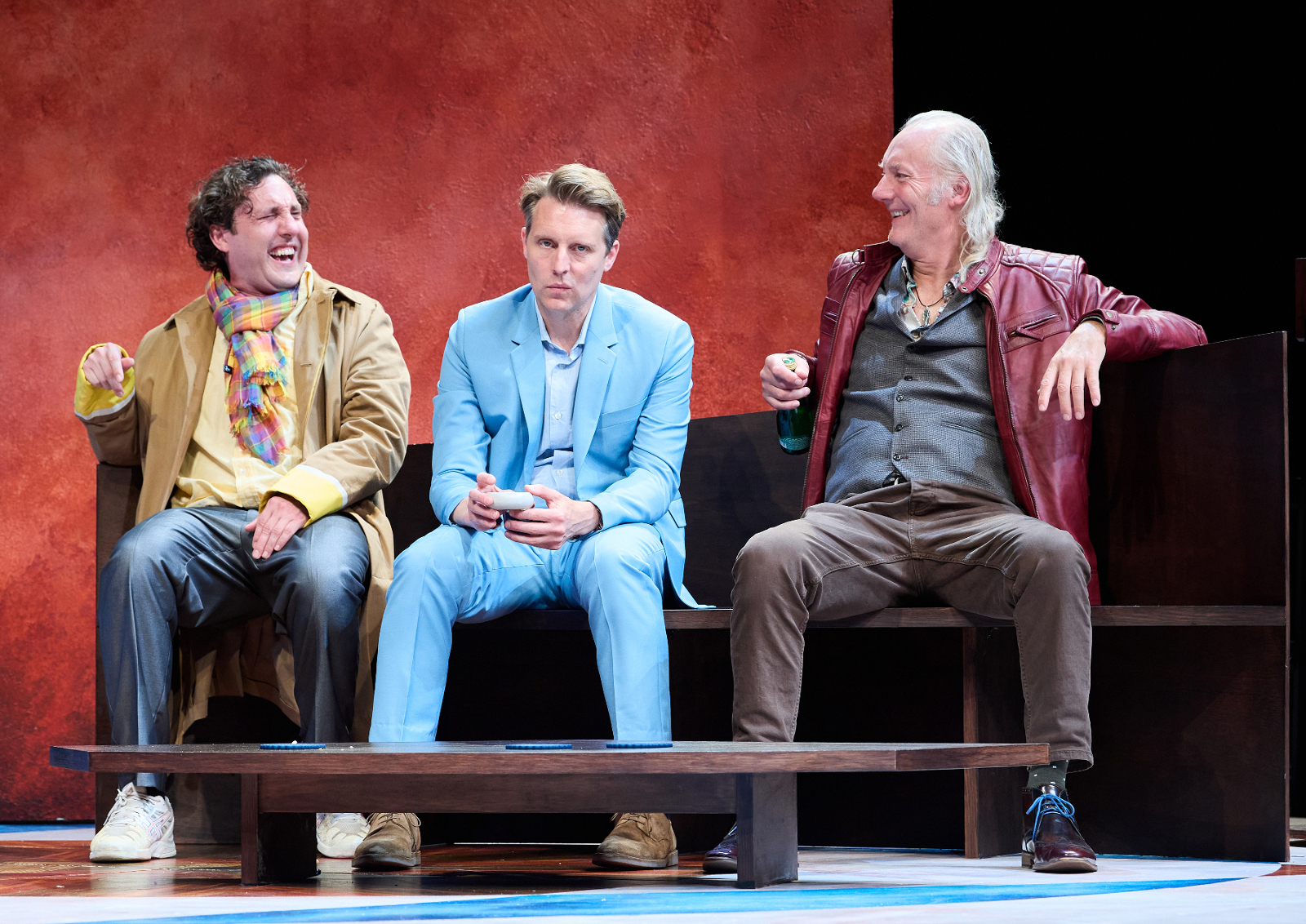Art, Theatre Royal Bath review - Yasmina Reza's smash hit back on tour 30 years after Paris premiere | reviews, news & interviews
Art, Theatre Royal Bath review - Yasmina Reza's smash hit back on tour 30 years after Paris premiere
Art, Theatre Royal Bath review - Yasmina Reza's smash hit back on tour 30 years after Paris premiere
Male friendships buckle as egos clash, with a resonance for today's culture wars

For men, navigating through life whilst maintaining strong friendships is not easy (I’m sure the same can be said for women, but Yasmina Reza’s multi-award winning play, revived on its 30th anniversary, is most definitely about men). What brings blokes together – work, sports, pubs – is seldom founded on deep emotional connections, though it can be and sometimes does morph into that.
For longstanding pals, Serge, Marc and Yvan, that ‘not much’ is a painting bought by Serge and proudly shown off to Marc. It is white – all white, though Serge insists otherwise – and Marc, offended at being invited to praise what he sees as the emperor’s new clothes, takes offence. Alpha male Marc butts up against beta male Serge with neither willing to compromise.
When gamma male, Yvan, arrives for a lads’ night out (wine not beer, arthouse cinema not the multiplex – France, you see), he just talks about his upcoming wedding. Believe me, nothing can harm male friendships like that subject and lines, which may or may not be in the painting, are certainly drawn between the men.
 Reza goes for a few easy laughs at the expense of non-figurative art and how markets determine prices underpinned by the suggestion that, within that hermetically sealed world, you can indeed fool all of the people all of the time. Those arguments do feel somewhat tired, even though there are echoes of how the Marcs of the 2020s have gained ground in challenging their targeted ‘elite’ in politics, media and culture. Dressing up ideology as common sense will never go out of fashion.
Reza goes for a few easy laughs at the expense of non-figurative art and how markets determine prices underpinned by the suggestion that, within that hermetically sealed world, you can indeed fool all of the people all of the time. Those arguments do feel somewhat tired, even though there are echoes of how the Marcs of the 2020s have gained ground in challenging their targeted ‘elite’ in politics, media and culture. Dressing up ideology as common sense will never go out of fashion.
The nub of the play and the place from where the laughs come with a deliciously hollow Chekhovian guilt, is in observing how ego drives a disagreement into an argument and on to a row, culminating in a destructive conclusion. I wouldn’t be surprised to learn that such a sequence plays out in female and mixed friendship groups, but it's certainly a trajectory men will recognise with a plaintive sense of regret. Up the scale from three to thousands, even millions, and you’ll find some of the drivers of intractable conflicts around the world. What is geopolitics if not three bickering boys in a nursery, older, but not wiser, with bigger toys and more back-up?
Ciaran Bagnall provides a set as clean and minimal as the painting itself for director, Iqbal Khan, to move his three not-quite-amigos-any-more around. Much of the humour feels French (all that coming and going Yvan does in trying to escape the Marc/Serge slanging match) but, when it doesn’t, it feels New York, where even a humble middle-manager can afford therapy.
Maybe that’s right. In London, and even less so elsewhere in the UK, no man would risk a friendship over a painting, such stakes being reserved for opinions about the Oasis reunion, Gareth Southgate’s record as England coach or Brexit.
Aden Gillett’s Marc (pictured above with Chris Harper and Seann Walsh), firing out the words of Christopher Hampton’s razor-sharp translation like exocets, is continually obstreperous, vested with the old man’s poisonous cocktail: the experience that ‘proves’ him right and the impatience that rules out challenge. The main target of his ire, Serge, is played with a certain insouciant charm by Chris Harper, who stands his ground in the face of Marc’s overcooked ridicule but also realises that a futile gesture is called for. How tempted he must have been to ask the older man if he was getting enough sex these days.
That, though, might have opened the door to the temptation in both writing and performance to topple into caricature, but the Pete and Dud and the Mel and Griff vibes are held at bay. Could an English playwright have gone so far without reaching for those well-worn comic memes? A Frayn probably, perhaps a Bennett, but for most others, the appeal of the broadness of pantomime and camp (the quintessentially English comedy vehicles) might have proved too much to resist. That said, the last ten years has seen transgression in English culture move from the essentially harmless saucy postcards and double-entendres to death threats online and families riven by irreconcilable differences over politics - laughing off feuds is so noughties darling.
Yvan, the would-be oil that smooths the grinding cogs in the spluttering friendship machine, doesn’t get very far in appeals to his friends’ better natures. Seann Walsh finds something of the pathos of his character’s namesake, Uncle Vanya, particularly in his failed interventions to get between foolish but articulate men, his growing realisation that his future is circumscribed by a life he didn’t choose and his bursts of self-determination, so swiftly extinguished. He’s our everyman and it’s somewhat disconcerting to see how little impact he makes on the rutting stags once they lock horns.
Wrapped up in 100 minutes all-through, I suspect the argy-bargy one witnessed on stage will come to mind again around Christmastime for some, when you meet up again with mates and one says, “Looking forward to seeing what Trump can do to crush the Wokerati stateside next year. Hopefully it’ll give Nigel some ideas for when he’s in charge here”. You feel the words, “But mate, we drank in the Students Union bar every night for three years in the Eighties” form in your head, but you actually say, “That Gavin and Stacey reboot was shit wasn’t it – about as interesting as a blank canvas?” Because British blokes are much happier bashing James Corden than they are falling out over politics or getting fighty about art. C’est la vie, savez vous.
rating
Explore topics
Share this article
The future of Arts Journalism
You can stop theartsdesk.com closing!
We urgently need financing to survive. Our fundraising drive has thus far raised £49,000 but we need to reach £100,000 or we will be forced to close. Please contribute here: https://gofund.me/c3f6033d
And if you can forward this information to anyone who might assist, we’d be grateful.

Subscribe to theartsdesk.com
Thank you for continuing to read our work on theartsdesk.com. For unlimited access to every article in its entirety, including our archive of more than 15,000 pieces, we're asking for £5 per month or £40 per year. We feel it's a very good deal, and hope you do too.
To take a subscription now simply click here.
And if you're looking for that extra gift for a friend or family member, why not treat them to a theartsdesk.com gift subscription?
more Theatre
 Troilus and Cressida, Globe Theatre review - a 'problem play' with added problems
Raucous and carnivalesque, but also ugly and incomprehensible
Troilus and Cressida, Globe Theatre review - a 'problem play' with added problems
Raucous and carnivalesque, but also ugly and incomprehensible
 Clarkston, Trafalgar Theatre review - two lads on a road to nowhere
Netflix star, Joe Locke, is the selling point of a production that needs one
Clarkston, Trafalgar Theatre review - two lads on a road to nowhere
Netflix star, Joe Locke, is the selling point of a production that needs one
 Ghost Stories, Peacock Theatre review - spirited staging but short on scares
Impressive spectacle saves an ageing show in an unsuitable venue
Ghost Stories, Peacock Theatre review - spirited staging but short on scares
Impressive spectacle saves an ageing show in an unsuitable venue
 Hamlet, National Theatre review - turning tragedy to comedy is no joke
Hiran Abeyeskera’s childlike prince falls flat in a mixed production
Hamlet, National Theatre review - turning tragedy to comedy is no joke
Hiran Abeyeskera’s childlike prince falls flat in a mixed production
 Rohtko, Barbican review - postmodern meditation on fake and authentic art is less than the sum of its parts
Łukasz Twarkowski's production dazzles without illuminating
Rohtko, Barbican review - postmodern meditation on fake and authentic art is less than the sum of its parts
Łukasz Twarkowski's production dazzles without illuminating
 Lee, Park Theatre review - Lee Krasner looks back on her life as an artist
Informative and interesting, the play's format limits its potential
Lee, Park Theatre review - Lee Krasner looks back on her life as an artist
Informative and interesting, the play's format limits its potential
 Measure for Measure, RSC, Stratford review - 'problem play' has no problem with relevance
Shakespeare, in this adaptation, is at his most perceptive
Measure for Measure, RSC, Stratford review - 'problem play' has no problem with relevance
Shakespeare, in this adaptation, is at his most perceptive
 The Importance of Being Earnest, Noël Coward Theatre review - dazzling and delightful queer fest
West End transfer of National Theatre hit stars Stephen Fry and Olly Alexander
The Importance of Being Earnest, Noël Coward Theatre review - dazzling and delightful queer fest
West End transfer of National Theatre hit stars Stephen Fry and Olly Alexander
 Get Down Tonight, Charing Cross Theatre review - glitz and hits from the 70s
If you love the songs of KC and the Sunshine Band, Please Do Go!
Get Down Tonight, Charing Cross Theatre review - glitz and hits from the 70s
If you love the songs of KC and the Sunshine Band, Please Do Go!
 Punch, Apollo Theatre review - powerful play about the strength of redemption
James Graham's play transfixes the audience at every stage
Punch, Apollo Theatre review - powerful play about the strength of redemption
James Graham's play transfixes the audience at every stage
 The Billionaire Inside Your Head, Hampstead Theatre review - a map of a man with OCD
Will Lord's promising debut burdens a fine cast with too much dialogue
The Billionaire Inside Your Head, Hampstead Theatre review - a map of a man with OCD
Will Lord's promising debut burdens a fine cast with too much dialogue

Add comment